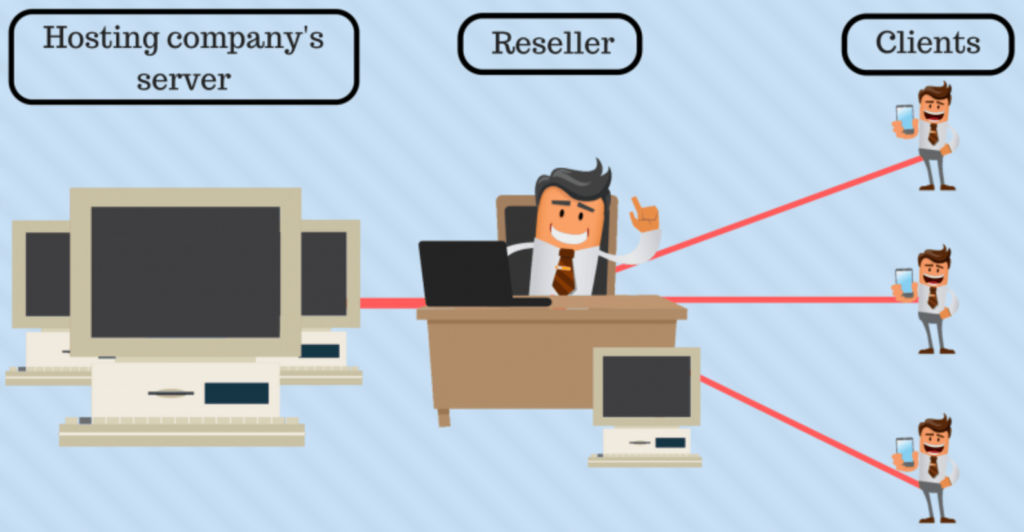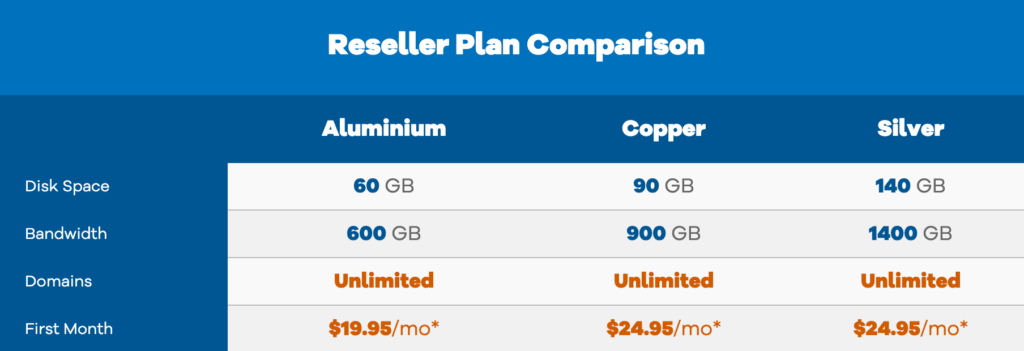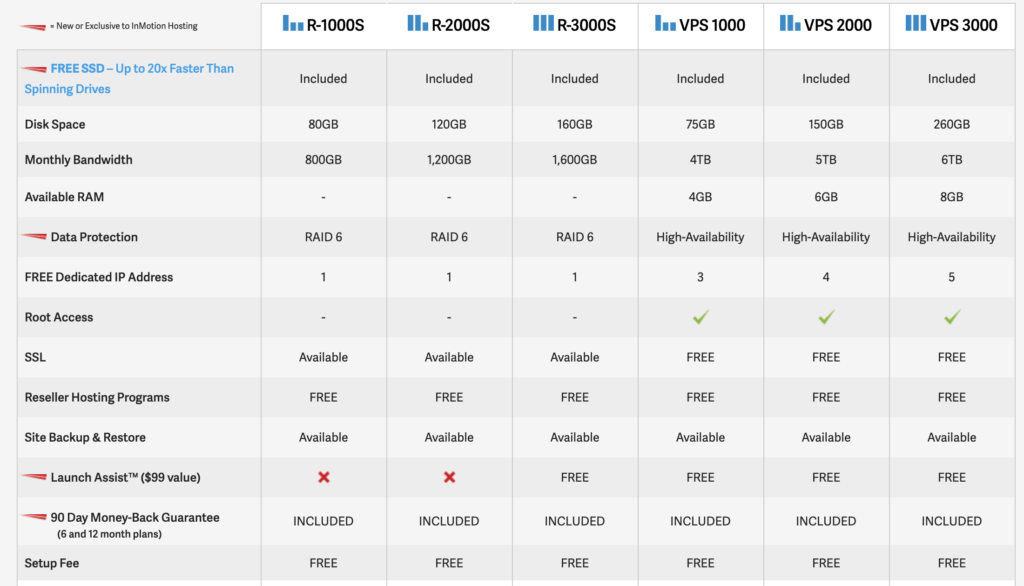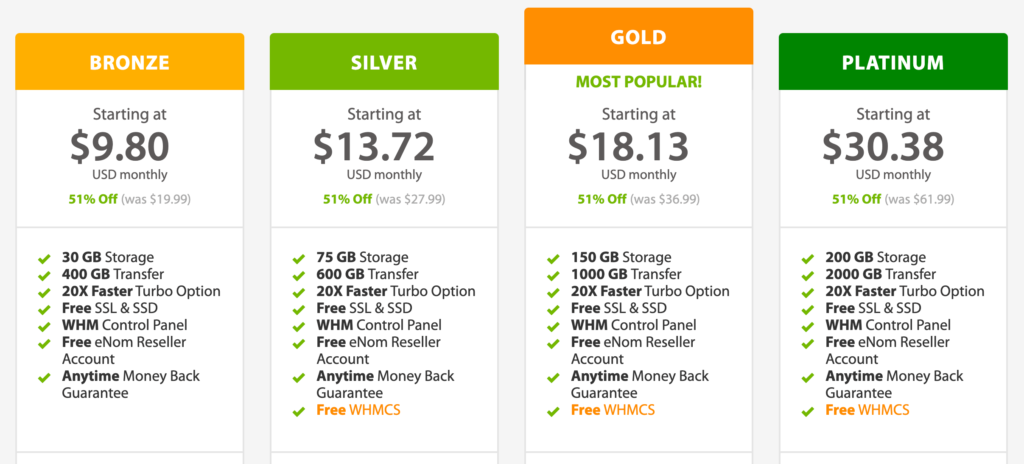الجمعة، 13 سبتمبر 2019
Whole Foods ending health benefits for part-time workers
Source Business - poconorecord.com https://ift.tt/2LtWug9
China to Lift Punitive Tariffs on US Soybeans, Pork
Source CBNNews.com https://ift.tt/2NbbstO
The Best Reseller Hosting Plans
Website hosting comes in all different shapes and sizes. Every website in existence needs to be hosted somewhere, so this makes sense.
If you’re a developer or have a web development agency, all of your clients need to have a suitable web hosting service. You can build web hosting costs into your existing client packages with reseller hosting plans.
Reseller hosting is great because the barrier to entry is far less complex than starting your own web hosting company from scratch.
You won’t need to worry about the hardware, resources, or other expensive costs associated with managing servers and hosting facilities. It’s a smart way for developers and agencies to earn some extra money from their existing clients.
What is reseller hosting?
Some of you may not have any experience with reseller hosting. So before we go any further, I want to make sure that we’re on the same page.
In a nutshell, reseller hosting makes it possible for you to sell web hosting to other people.
It’s essentially white label website hosting. You buy the service from a larger hosting company, and then resell that service to your clients.
The reseller focuses on marketing and sales while leaving all of the heavy-lifting to the larger hosting service.
With reseller hosting, you set the hosting prices for your clients. As long as the provider gets their monthly rate, the sky is the limit for what you can charge. Since you’ll be paying wholesale rates to the hosting company, there’s an opportunity for you to make substantial profit margins.
It may sound confusing at first, but it’s really not that complicated. Here’s a simple visual representation of how reseller hosting works.

If you pitch it correctly, your clients will love this option. You become a one-stop-shop for their website. You’re already handling things like development and design, so why not handle the hosting as well?
Who is reseller hosting for?
Reseller hosting is not for everyone. If you’re launching a website from scratch, or you’re just looking for a new web hosting provider, reseller hosting is not for you.
For the most part, reseller hosting is for web developers, web designers, and agencies.
However, if you’re an entrepreneur in the tech space, you might see an opportunity here to earn some extra money as a reseller.
For example, if you own a local computer shop, you could potentially start reselling hosting packages to customers in your community.
Whether you’re a solo developer, large enterprise, or anywhere in-between, reseller hosting is only suitable for you if you’re planning to manage at least 10 websites or more. Anything less than that won’t really be worth your time or effort.
Aside from the additional profits you can make from your current client packages, reseller hosting is a great way to retain your customers for the long term.
If you develop and design a website for someone, they won’t need your services forever. But if you can simultaneously manage their hosting service, then you’ll continue to get recurring income long after the development is complete.
Best reseller hosting providers and plans
Now that you’re ready to proceed with reseller hosting, it’s time to find a service provider and hosting plan that meets your needs.
Reseller hosting plans vary by price, features, and benefits. A local business planning to manage 10 websites won’t need the same plan as an agency managing 100 sites.
With that in mind, I’ve narrowed down the best reseller hosting plans for every scenario. If you want to be a reseller, there’s a plan for you on this list.
HostGator
HostGator is an industry leader in the web hosting space. Like the rest of their web hosting services, HostGator’s reseller options are great. They offer three different reseller plans.
As you can see, the price points for all three are within $5 of each other. But you need to understand that this is just a promotional rate for new customers.
The plans renew at $29.95, $41.95, and $59.95, respectively. But you can lock in this introductory rate for your first 36 months.
All reseller plans come with great benefits like:
- Unlimited domains
- Free SSL certificate
- Private name servers
- Email accounts
- FTP accounts
- MySQL accounts
The biggest difference in the packages is the disk space and bandwidth. So the plan you choose will depend on how many sites you plan to manage, and how much traffic and storage those websites need.
Fortunately, HostGator makes it easy for you to scale. If you start with the Aluminum or Copper plan, you can upgrade for free at any time.
All reseller plans come with free WHMCS billing software, which makes it easy for you to manage your clients.
You’ll also get WHM control panel for monitoring your server status, and setting limits for things like disk space and bandwidth for your clients.
If you’re already a reseller and want to switch providers, HostGator offers up to 80% off transfers and registrations.
HostGator guarantees a 99.9% uptime rate. So you won’t have to worry about your clients being upset with the performance of their website.
Another reason why I recommend HostGator for reseller hosting is because of their support.
They offer 24/7 customer service via phone and live chat. Automatic weekly backups and 24/7 server monitoring are standard as well. Plus, you’ll get a 45-day money-back guarantee, which is more than enough time to see if you’re satisfied with your plan.
SiteGround
SiteGround is another big player in the web hosting industry. So it’s no surprise that they offer excellent reseller hosting plans.
Pricing for the SiteGround reseller program is a bit different from HostGator. They charge you based on how many accounts you’re managing.
You’ll get volume discounts for buying in bulk. So the more accounts you manage, the cheaper it is per account. Here’s how it works.
SiteGround sells “reseller credits.” Each credit is worth one year of hosting for a website.
- $49 per credit if you buy 1-4 credits
- $45 per credit if you buy 5-10 credits
- $42 per credit if you buy 11+ credits
You need to buy a minimum of five credits to get started initially. Credits never expire, so you can use them to add or renew accounts at any time.
Let’s break those costs down even further to give you a better understanding of what you’re paying compared to other reseller plans. If you start with the minimum and buy 5 credits at $45 each, it’s going to cost you $225 per year.
That ends up being $18.75 per month. That’s just $3.75 per client, per month, assuming you have at leave five clients.
Each website hosted on your reseller plan will get 10 GB of disk space, and has the capacity to handle roughly 10,000 monthly visitors.
These specifications make SiteGround a top choice for resellers with clients that don’t have a ton of website traffic. If you’re a small agency and only have a handful of websites to manage, SiteGround’s credit pricing system makes it possible for you to become a reseller.
InMotion Hosting
Unlike other web hosting providers that offer three or four reseller hosting plans, InMotion Hosting has six!
So if you like to have options, it’s safe to say that InMotion has plenty. Here’s a breakdown of what each reseller plan offers.
The “R” packages are shared hosting plans, and the “VPS” packages are virtual private servers.
Things like disk space, monthly bandwidth, and dedicated IPs increase with each plan. Pricing for the InMotion Hosting reseller plans are as follows:
- R-1000S — $15.39 per month (renews at $29.99)
- R-2000S — $21.99 per month (renews at $39.99)
- R-3000S — $30.24 per month (renews at $57.99)
- VPS 1000 — $41.64 per month (renews at $54.99)
- VPS 2000 — $62.84 per month (renews at $94.99)
- VPS 3000 — $89.94 per month (renews at $164.99)
How does this compare to other hosting providers we’ve reviewed so far? Let’s take a look.
HostGator’s top package offers 140 GB of disk space and 1400 GB of bandwidth. The R-2000S and R-3000S from InMotion would be the closest plans to this. Both of these are at similar price points as well.
The biggest difference is that InMotion doesn’t stop there. Their top VPS plan has 260 GB of disk space and 6 TB of bandwidth per month.
Essentially, this means that InMotion’s reseller plans can handle more clients and more monthly traffic than the other options on our list. They offer beginner reseller plans like the R-1000S, advanced plans like the VPS 3000, and still, have four other plans in-between.
With a VPS reseller plan, you can even manage ecommerce websites. You’ll have root access as well to make custom changes to your server.
InMotion offers free billing software, free cPanel and WHM, free SSD drives, white label services, DDoS and malware protection, and server management features for select packages.
They also have a 90-day money-back guarantee, which is almost unheard of in the web hosting space.
Overall, InMotion Hosting has a reseller plan for everyone. But it’s definitely a top choice for resellers who are managing lots of clients.
A2 Hosting
A2 Hosting has a reputation for speed and reliability. Both of which are crucial in the web hosting industry.
Their reseller choices are great for those of you who want a quality service in a low-to-mid price range. Here’s an overview of A2’s reseller hosting plans.
With plans starting as low as $9.80 per month, A2 Hosting is definitely cost-effective.
However, I would not recommend the Bronze package. It only has 30 GB of storage, which isn’t nearly enough if you’re planning to have more than a few clients. Plus, it’s their only plan that doesn’t come with Free WHMCS, which is crucial for client management.
You can buy the WHMCS add-on for $10 per month, but at that point, you might as well upgrade to a package that includes it for free.
While we’re on the subject, the free WHMCS starter package for the Silver, Gold, and Platinum plans is suitable for up to 250 clients. So you definitely have the opportunity to scale.
At a minimum, I’d recommend starting with the Gold plan. You get double the disk space (compared to Silver) for less than $10 more per month of the renewal rate. For me, that’s a no-brainer.
A2 Hosting is committed to a 99.9% uptime rate. Their servers are up to 20 times faster than their competitors, and they have an amazing customer support system.
GreenGeeks
GreenGeeks isn’t as well known as some of the other hosting providers on our list. They’ve been in business for 11 years, and offer eco-friendly web hosting solutions.
Reseller hosting is a service that they specialize in. GreekGeeks has five different reseller plans, which are all very straightforward.
Their packages can be purchased in quantities of 10 clients. The more clients you have, the more cost-effective it is per account.
If you fall somewhere in the middle of these tiers or have more than 50 clients, you can purchase additional accounts in bundles of 5.
The discounted pricing for additional accounts is:
- Reseller 10 — $3.00 per account
- Reseller 20 — $2.75 per account
- Reseller 30 — $2.50 per account
- Reseller 40 — $2.25 per account
- Reseller 50 — $2.00 per account
For example, if you have the Reseller 50 plan and need to add 13 new accounts, it would cost you an additional $30 per month (you would have to buy 15 more accounts).
All GreenGeeks reseller plans come with great benefits like:
- Unlimited web space
- Unlimited bandwidth
- WHMCS licenses
- White label services
- Ecommerce capabilities
- Free CDN integration
- Nightly backups
- 24/7 support
Plus, GreenGeeks uses renewable energy to power their hosting services. So it’s a great option for those of you who are conscious of the environment and want to market green web hosting to your clients.
This reseller service is made with developers in mind. You’ll get multiple PHP versions, MySQL databases, FTP accounts, support for Perl and Python, and access to the latest developer tools like WP-CLI, Git, Drush, and lots more.
All GreekGeeks reseller plans come with a 30-day money-back guarantee. It’s definitely nice to have that assurance to fall back on.
GoDaddy
GoDaddy is best known for its domain registrar services. But they’re also a reputable web hosting provider and have great options for reseller hosting.
They have four reseller plans to choose from.
Enhance
- Starting at $39.99 per month
- 2 CPUs
- 4 GB of RAM
- 90 GB of storage
Grow
- Starting at $49.99 per month
- 3 CPUs
- 6 GB of RAM
- 120 GB of storage
Expand
- Starting at $64.99 per month
- 4 CPUs
- 8 GB of RAM
- 150 GB of storage
Established
- Starting at $89.99 per month
- 4 CPUs
- 16 GB of RAM
- 240 GB of storage
To get the prices listed above, you need to commit to 36 months. Unlike other hosting providers, GoDaddy doesn’t advertise a more expensive renewal rate when your contract expires. Although they do have a disclaimer stating that renewal rates are subject to change. So I guess we’ll see what happens in three years.
All reseller plans include WHMCS and cPannel for up to 250 accounts. They offer unmetered bandwidth, free SSL certificate, and 24/7 customer support.
In addition to hosting services, you can also sell GoDaddy domains and other third-party products with the reseller plans listed above.
Conclusion
Reseller hosting is a great way for developers, agencies, and entrepreneurs to earn recurring revenue with white label web hosting.
There are so many different reseller hosting providers and plans available on the market today. Rather than sifting through all of those options on your own, I took the time to research and identify the best choices.
So which reseller hosting plan is the best? It depends on what you’re looking for. He’s a quick summary of the plans above:
- HostGator — Best cost-effective reseller plans.
- SiteGround — Best for managing small sites with less than 10,000 visitors per month.
- InMotion Hosting — Best VPS plans for managing ecommerce sites.
- A2 Hosting — Best for scaling small-to-medium-sized client lists.
- GreenGeeks — Best for developers who prioritize eco-friendly hosting.
- GoDaddy — Best for reselling more than just web hosting.
If I was forced to pick a best overall reseller hosting plan from this list, it would probably be InMotion Hosting. Their VPS plans really give you the opportunity to scale a larger client list with high volumes of monthly traffic.
But with that said, not everyone is looking to pay a premium price for top-of-line features.
That’s why I made sure to include a reseller hosting plan for as many different scenarios as possible in this guide. I’m confident you’ll find what you’re looking for on my list.
Source Quick Sprout https://ift.tt/2ZUAOml
When Do You Need Life Insurance?
When I graduated from college, a thoughtful relative of mine gave me a letter she had typed out on her computer. It was about twenty pages of material that she had typed out over the course of a number of years, and she printed out a version of it for every relative of hers who graduated from college or trade school or high school, given at the point where it was clear that they were about to enter the workforce.
The letter mostly contained a ton of different practical life advice and suggestions about how to navigate life as an adult. I don’t have it any more – it was wiped out when my apartment flooded at some point in the mid-2000s – but I do remember much of the advice.
One piece of advice that I remember stewing over was the suggestion to get life insurance. She said to get a big thirty year policy that would cover me through the years when I would be raising kids and to get it young so the premiums were cheap. It’s really good advice, but I didn’t really internalize it and never bothered to get a policy.
Instead, I waited around until my firstborn was a couple of years old and then I got a 20 year policy, which would cover the loss of my income during the period when we would have kids at home.
Looking back, I clearly understand why I didn’t get a policy at first and why I did get a policy later. At first, I really didn’t have anyone depending on me, so what was the point of having a big life insurance policy? Later on, people were depending on me, so a life insurance policy made sense.
In the end, that’s the key answer to whether or not you need a life insurance policy. Is anyone else depending on your income in order to maintain their quality of life? If you disappeared, would the void of a lack of income create hardship in the lives of people that you love? If the answer is no, then you (probably) don’t need life insurance. If the answer is yes, then you should probably get a policy.
Let’s look at a few specifics.
First of all, if you’re single with no plans to be in a long-term relationship and no plans for children, a life insurance policy is probably not a very high priority. You almost definitely have financial priorities in your life that greatly supersede a life insurance policy, so take care of those things. Things like debt repayment and retirement savings take a much higher priority here.
On the other end of the spectrum is people with children, who should have some significant form of term life insurance to help provide for those children should an unfortunate event happen. The term of that policy should last into the adulthood of your children so that if something happens to you at any point during their growing years, they’ll be financially taken care of. It is a very good idea to couple this action with a clearly-stated will that identifies who is to become the guardian of your children in the event of your untimely death. This is a decision we wrestled with greatly, but when we made our decision, it was clear that it was the right decision, and it’s one that we wanted to spell out in legally binding terms.
The challenge comes with situations that are in the middle, and you’re likely to get a lot of contradictory advice. Here are some principles I recommend.
If you don’t have any life insurance and have at least some realistic chance of having a child in the next ten years, you should get a thirty year term policy now rather than later. The reason is simple: getting such a policy now, when you’re in relatively good health and as young as you’ll ever be, lowers the overall risk of the policy and thus lowers the cost of it. In general, a 30 year term policy starting today will cost less in total than a 20 year term policy starting in ten years, simply because of the risk of medical issues cropping up in those intervening ten years.
If you are in a long term relationship with someone and your partner would be financially unstable without your income but children are not planned or expected, consider a shorter term policy. You’ll want to be sure to cover the years in which you expect that your partner would be in financial difficulty without your income, and the benefit for that policy should be enough to make up for that financial shortfall in your partner’s life.
Another valuable principle to follow: as soon as you realize that your situation has changed and you’re now in a situation where life insurance is important, get a policy now rather than later. The reason is that the younger you are, the less expensive term life insurance will be, plus you run the risk of experiencing a loss of life or a serious health issue between now and when you get the policy. The sooner you get it, the better.
The truth is that life insurance is about having a good grasp as to where you’re trying to go with your life as well as having a sense of responsibility for those choices. I am financially responsible for my children because we made the decision to bring them into this world and they’re not capable yet of earning an income of their own, thus I need to do all I can to help shepherd them to that point. I am also financially responsible for my wife, to an extent – she’s quite capable of earning a solid income on her own, but there would be financial impact if my income were to suddenly disappear, and my financial planning needs to take that into account.
What should you buy if you determine that you need life insurance? My general recommendation is to get a term policy with a term long enough to cover the period in your life where you have dependents whose lives would be very adversely affected by losing your income and a benefit large enough to replace your income for ten years. As for who to buy from, the market changes frequently, so I’ll point you to The Simple Dollar’s guide to life insurance companies for help in your decision. In general, I recommend shopping around amongst well-established and reputable insurance providers before choosing a policy, and I would make sure to look at providers who cater to specific groups you might be a part of, such as veterans or teachers or members of a particular faith.
The key thing to take home is this: life insurance is merely a tool that takes care of people who depend on you in the event of your death. Term life insurance is the most cost-efficient way of taking care of this. Buy a term policy that will cover the people who depend on you for as long as they’ll depend on you, and that will help you figure out the term that you need and the benefit that you’ll need.
A final note: having a healthy life insurance policy that will take care of my wife and children is a notable stress reliever. It takes care of that worry that many people who have long-term partners and also many people who have children have, that if something were to happen to them it would have a catastrophic impact on their family. There’s nothing you can do that will replace your presence, but this is a part of the equation that you can control, and it’s one that, when you do take care of it, brings genuine peace of mind.
If you’re in a situation where a life insurance policy does make sense, it is a very responsible use of a surprisingly small amount of money, and making that move will bring you some peace of mind as well.
Good luck.
The post When Do You Need Life Insurance? appeared first on The Simple Dollar.
Source The Simple Dollar https://ift.tt/2NcPtCH
Dear Penny: I Have Credit Card Debt, but I Seriously Need a Vacation
Dear In Debt,
In mathematical terms, the answer is super easy. You’re probably paying double-digit interest rates on your credit cards, so of course you should use your vacation fund to wipe out some of the balance.
But like so many life decisions, this one isn’t easily solved by an equation.
Sure, a vacation is a want, not a need. But a vacation can do wonders for your mental health and stress levels. Isn’t the daily grind so much more bearable when there’s a reprieve on the horizon? So yeah, I really want you to go see the Northern Lights.
But there are two things that worry me here.
For starters, how much vacation will $1,000 really buy you in Iceland? While you’ll often find great deals on airfare to Iceland, it’s known as a pretty pricy destination for meals and accommodations. Plus, keep in mind that vacations seem to always have a way of costing way more than we budgeted for. You have to expect those unexpected expenses, like taking a cab in bad weather, along with a little impulse spending because, hey, when’s the next time you’ll be in Iceland.
The other thing that concerns me is your statement that a health expense is “the only real emergency I can see happening.” Call me a pessimist, but I can think of infinite ways things can go wrong. Suppose, for example, you had to miss a week or two of your restaurant job because you had the flu or had to care for a family member. Would it put you deeper into the credit card hole?
Ordinarily, I’d lecture you about having an emergency fund, but since you’re on Medicaid and Medicare, I’m guessing you’re probably limited as to how much you can have in assets. That means it’s important to have credit available should you encounter an unexpected expense.
With all that in mind, I’m going to propose a compromise: You don’t have to start from scratch and use your Iceland fund for your credit card debt so long as you’re current on payments — but hold off on your travels for just a little bit longer.
Start hounding the client who owes you $1,000, and when they pay you, put every cent toward paying down your balance. From there, apply whatever excess money you’ve been able to set aside for vacation to your debt.
This strategy will cost you a little more than you’d pay if you just used the money you’ve saved to attack what you owe because, yeah, you’ll still be paying interest. But knowing that you already have money set aside for your trip will be a huge motivator as you pay off the remainder.
I get that it’s frustrating to delay your plans when it’s been three years since your last vacation, but you’ll have less than $2,000 to go. You can do this.
Once you’ve paid off your debt, you have my approval to take this trip, with the caveat that you’ve budgeted carefully and saved enough that you won’t go back into debt as a result.
From there, go watch the whales, soak in the Blue Lagoon, do whatever the heck else they do in Iceland — and hey, don’t forget to send me a picture.
Robin Hartill is a senior editor at The Penny Hoarder and the voice behind Dear Penny. Send your questions about budgeting to AskPenny@thepennyhoarder.com.
This was originally published on The Penny Hoarder, which helps millions of readers worldwide earn and save money by sharing unique job opportunities, personal stories, freebies and more. The Inc. 5000 ranked The Penny Hoarder as the fastest-growing private media company in the U.S. in 2017.
source The Penny Hoarder https://ift.tt/2NkMuID
5 Money Milestones Every Parent Needs to Accomplish Before Their Kids Turn 10
We get it. You’ve been busy since you found out you were expecting.
Baby preparations turn into sleepless nights turn into homework-filled afternoons…
So when it comes to money, you’re probably just trying to pay your bills on time, right? That’s a good move, but you’re probably forgetting about some bigger milestones you should achieve before your kid gets too old.
No need to overwhelm yourself and do these all today. We set these up in order of priority, so let’s start with the easiest — yet, arguably, most important — first.
Before They’re Born: Secure Their Future
Have you thought about how your family would manage without your income? Without your support? Maybe you’ve worried about this a little too much since your little one has entered the picture.
That’s totally normal, but you might be able to tame a few of these anxieties by securing life insurance, which will help ensure your family is finally secure if anything happens to you.
You’re probably thinking: I don’t have the time or money for that. But your application shouldn’t take more than about five minutes — and you can secure a policy starting at $5 a month through a company called Bestow. Yeah, no need to pay hundreds of dollars a month.
“The biggest mistake I see millennials making is being duped by insurance salesmen,” says Andy Yadro, a financial planner with Googins Advisors in Madison, Wisconsin. “Everyone needs insurance, but a very small subset of young people need the insurance that is sold by most financial advisers.”
So if you’re under the age of 54 and want to get a fast life insurance quote without the medical exam, pushy sales calls or even getting up from the couch, check out Bestow. The company is built around one concept — helping you get the term life insurance policy you want, simply and fast.
It just takes five minutes to answer some basic lifestyle questions, and you can get quotes for up to $1 million in coverage without a medical exam. If you’re approved, you can personalize your coverage to fit your budget. You can change or cancel your plan at any time.
Now you can rest a little easier tonight.
When They’re 2: Open a High-Yield Savings Account
Remember when you turned 18 and jumped ship into adulthood? Errr, well, tried to jump into adulthood? For many of us, that was a tough time. If you want to give your kid a little boost, set them up with a savings account.
You don’t have to contribute anything major. Think about it: If, when they’re 2, you start putting $25 into an account once a month until they turn 18, that leaves them with nearly $5,000. That’s enough to help with the cost of college living, starting a small business or backpacking through Europe.
And if you stash the money in a high-yield savings account, the balance will grow even more, thanks to that sweet, sweet compound interest.
When They’re 6: Talk to Them About Money
If you’re going to work hard to build your kid’s savings, then you probably want them to use it responsibly, right? That’s why it’s important to teach them the value of a dollar early on.
One fun way to do this? Take them grocery shopping. Give them a mini-cart or basket, and let them walk through the store with you. Point out what’s considered a want and what’s considered a need. Fresh doughnuts from the bakery? That’s a want. That loaf of bread? That’s a need.
Another classic way to teach kids about money is to set up an allowance for chores. Of course, they’ll want to spend this money on a toy. That’s OK! This exercise helps them understand the value of a dollar.
Before They Turn 10: Involve Them in Financial Decisions
As your kid gets older, they’ll want to participate in every after-school activity, attend every summer camp and buy every new piece of technology.
Instead of feeling guilty — or caving and overspending — let your child hear and participate in your household conversations about money.
“Classically, parents will go behind a closed door to talk about saving, budgeting and investing,” says Maggie Johndrow, a financial adviser at Johndrow Wealth Management. “But psychologists have found that will make your children think finances are scary, taboo and something that’s not to be talked about in the open.”
Instead, Johndrow encourages parents lay it all out there. Let your child know your budget for after-school activities, for example, then work together to choose what’s affordable.
“Empower them and teach them by giving them that choice,” Johndrow says.
Now, that wasn’t so bad, right? Almost easier than remembering to pay your bills each month.
This was originally published on The Penny Hoarder, which helps millions of readers worldwide earn and save money by sharing unique job opportunities, personal stories, freebies and more. The Inc. 5000 ranked The Penny Hoarder as the fastest-growing private media company in the U.S. in 2017.
source The Penny Hoarder https://ift.tt/31fU2iW
What’s the prognosis for the NHS pension?
Source Moneywise - 29 years of helping you with your finances https://ift.tt/2NYU3Eb
My £5,500 bike has been lost by Hermes. Should I call the police?
Source Moneywise - 29 years of helping you with your finances https://ift.tt/2ZXdqok
Why won’t my banks lend me money against my mortgage-free home?
I have been thoroughly confused by my two banks’ refusal to lend me money. I own my home outright and it is valued at around £450,000. I owe £38,000 on (mostly) 0% credit cards. No other lending was available to me at the time, and this was accrued due to a somewhat expensive divorce.
I earn around £24,000 a year.
I want to take out a mortgage on my home to clear my credit-card debts and my £20,000 car loan. I was told I would be eligible to borrow up to £102,0000, provided I had no debts. I’ve pointed out that the mortgage is purely to pay off my debts; if I borrowed £58,000 against my home, I would not then have any debt, but this has fallen on deaf ears. How do I move it forward?
It sounds as though you need further clarity from your bank as to why they have misgivings about offering the level of borrowing that you hoped for.
Most lenders will allow an amount of debt consolidation when taking a new mortgage, usually applying a limit to the maximum percentage of the property value. In this case the loan-to-value ratio would be low so it should not be a problem.
All lenders will conduct an affordability check to include income and outgoings but there are many that should be able to account for the fact that the debts will be repaid in full on completion of the mortgage.
However, there can be other factors that could affect a lender’s decision. Some will limit the amount of debt consolidation to a maximum amount of £50,000 or less. That could therefore be the cause of the problem, in this case due to the level of borrowing. Others could have misgivings about the level of debt compared with income, either in terms of monthly income required to service the loans or in comparison with annual income. That may require more detail around how and why the credit-card debts were accrued, which as you say is as a result of the divorce.
Consolidating unsecured debts into a mortgage can look appealing as a way of reducing the monthly payment, given the low rates on mortgages.
However, there are other considerations as it could come at the cost of turning short-term unsecured credit into much longer-term debt secured against the home. That could result in more interest being payable over the life of the loan and put the home at risk if payments were not maintained. It is also crucial not to clear shorter term debts like credit cards only for them to begin to build up again.
Ultimately, though, there should be some alternative options to consider if you do decide that a mortgage is the best way forward, and shopping around may help you find lenders that are more flexible in their approach.
Source Moneywise - 29 years of helping you with your finances https://ift.tt/2NYgl8Z






